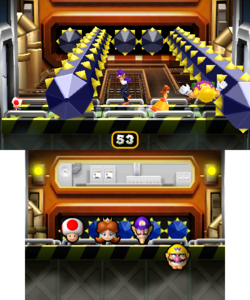Kabob and Weave
From the Super Mario Wiki, the Mario encyclopedia
(Redirected from Squish Kebab)
Jump to navigationJump to search
| Kabob and Weave | |||
|---|---|---|---|

| |||
| Appears in | Mario Party: Island Tour | ||
| Type | General minigame | ||
| Time limit | 60 seconds | ||
| Music track | Survival! | ||
| |||
Kabob and Weave (known as Squish Kebab in the British English version) is a General minigame from Mario Party: Island Tour. The American name is a combination of the food "kabob", and the boxing term "bob and weave"; the British name is a pun on "shish kebab".
Introduction[edit]
The four players and a blue Toad all enter a factory, and stop on a metal platform. An alarm goes off, and all of the characters are startled by the middle Skewer popping out of the wall. The blue Toad is knocked away while all the players dodge, and the minigame begins.
Gameplay[edit]
The players have to avoid being touched by the five Skewers in the background. If a player is touched by a Skewer, they are out. The last player left standing, or the players left standing when time runs out win.
Controls[edit]
– Move
– Jump
In-game text[edit]
- Rules – American English "Run and jump to avoid the Skewers for as long as possible."
- Rules – British English "Dodge the Spike Pillars for as long as possible."
Names in other languages[edit]
| Language | Name | Meaning | Notes |
|---|---|---|---|
| Japanese | トゲこんぼうをかわせ![?] Toge konbō o kawase! |
Alternating Skewers! | |
| Dutch | Spijkerspies[?] | Nail Pike | |
| French (NOA) | Brochette de vedettes[?] | - | |
| French (NOE) | Brochette de stars[?] | Skewer of stars (expression meaning "a bunch of stars") | |
| German | Spießrutenrempelei[?] | Skewer Jostle | |
| Italian | Rulli pericolosi[?] | Dangerous rollers | |
| Korean | 가시기둥을 피해라![?] | - | |
| Portuguese | Máquina de Espetos[?] | Skewer Machine | |
| Russian | Шипорубка[?] Shiporubka |
Thorn axing | |
| Spanish | Plataforma espinosa[?] | Spiny Platform |
Trivia[edit]
- In the minigame intro, the doors on the left and right side of the screen shut if four players are competing. If there are two or three, the doors do not shut; however, they still act as walls.